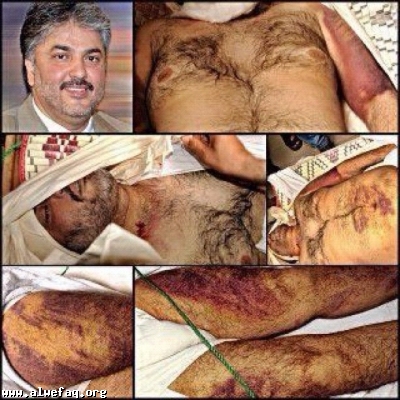Police convictions intended to dodge justice and regime accountiblity for torturer and murder of Abdul-Karim Fakhrawi
Judgments in Fakhrawi’s case of torture to death lack seriousness
31 December, 2012 – Al-Wefaq

Al-Wefaq National Islamic Society stated that the Bahraini regime is mocking with cases of extrajudicial killings against citizens despite its acknowledgement of such cases after the Bassiouni report has confirmed them. The regime is circumventing and running away from prosecuting killers by changing the classification description of the crime from torture to beating leading to death, by this the regime is mocking with facts, al-Wefaq added
Al-Wefaq said the judgment to convict two intelligence services personnel and acquit two others, all accused of involvement in the killing of Bahraini business man and publisher, the martyr Abdul-Karim Fakhrawi, is a total irreverence to and cover for impunity policy.
Al-Wefaq further clarified, in its statement issued Sunday 30th December 2012, that the Bahraini regime does not want to build for prosecutions in torture cases against citizens and it attempts to change facts although the Bassiouni report has classified a number of cases, including Fakhrawi’s, as “deaths caused by torture”.
Al-Wefaq pointed out that there has not been a single judgment in Bahrain courts against torturers since the state was established in early 70s.
The statement said, “can torture practised during the state of emergency, and that had led to the death of four citizens in ten days, be considered a fight?”
Al-Wefaq considered the judgment based on non-serious measures of justice to victims, as the prosecution has considered the killing reckless acts of lower-ranked staff in order to exempt higher officials and let them continue to act with impunity. The Bahrain Independent Commission of Inquiry (BICI) report has confirmed torture in Bahrain as systematic and not individual cases, which means that higher officials in both the Ministry of Interior and the intelligence services (National Security) are responsible for torture and deaths caused by torture, and this is exactly why the Public Prosecution’s interrogations are insignificant and non-serious.
Al-Wefaq stated that the number of the accused and their posts proves that all the prosecution wants is to take on sham measures as part of its travesty of justice, by presenting lower officers claiming remedies for victims, however, the measures and questions of interrogations prove lack of seriousness to hold the killers and criminals accountable.
Al-Wefaq pointed out that the Public Prosecution and the court have clearly amended the case to fit protection for the accused. As the accusation has been amended to unintentional beating to death, which takes a 7 year sentence at most, while they were not accused of torture to death despite the circumstances of the case as the main purpose was to obtain coerced confessions from the martyr Fakhrawi.
Al-Wefaq expressed fears that the Appeals Court might acquit or reduce sentence of the criminals, or order to stop the implementation of the judgment after pressure is gone.
Al-Wefaq noted that the jail sentences against the accused have been issued without execution, unlike the judgment against human rights defender Nabeel Rajab, which has made him a hostage.
This brings us to compare the judgment to that of Kuwait’s which was issued a few days ago against officials who resorted to torture, as the Kuwaiti Minister of Interior has resigned following these unlawful acts, in order to prove seriousness in addressing torture, whereas the Bahraini judiciary’s handling of such issues prove that torture is a state policy to protect torturers.
Al-Wefaq stated that Sunday’s judgment (in Fakhrawi’s case) proves that the special unit of torture cases in the Public Prosecution and the Judiciary have failed to address human rights violations and claim remedies for victims. It further proves that any superficial solutions for this judiciary will fail, whether its special units or legislations, this judiciary needs a deep root reform, the statement said.
The statement concluded, al-Wefaq sees that the principle of accountability to human rights violators and punishment of criminals can only be achieved by benefiting from experiences of states that witnessed unlawful human rights violations in the absence of an impartial judiciary. Bahrain needs special courts established by international investigators to re-investigation and decide on issues related to violations. Al-Wefaq believes that the formation of a special court under international will and observation is the only way to track down human rights violators and hold them accountable. …source






























Add facebook comments
Kick things off by filling out the form below.
Leave a Comment